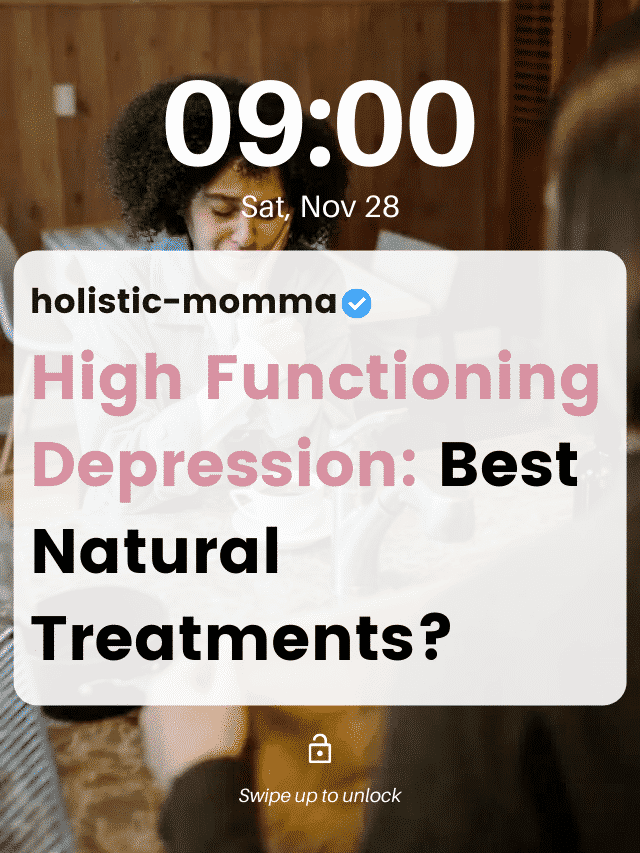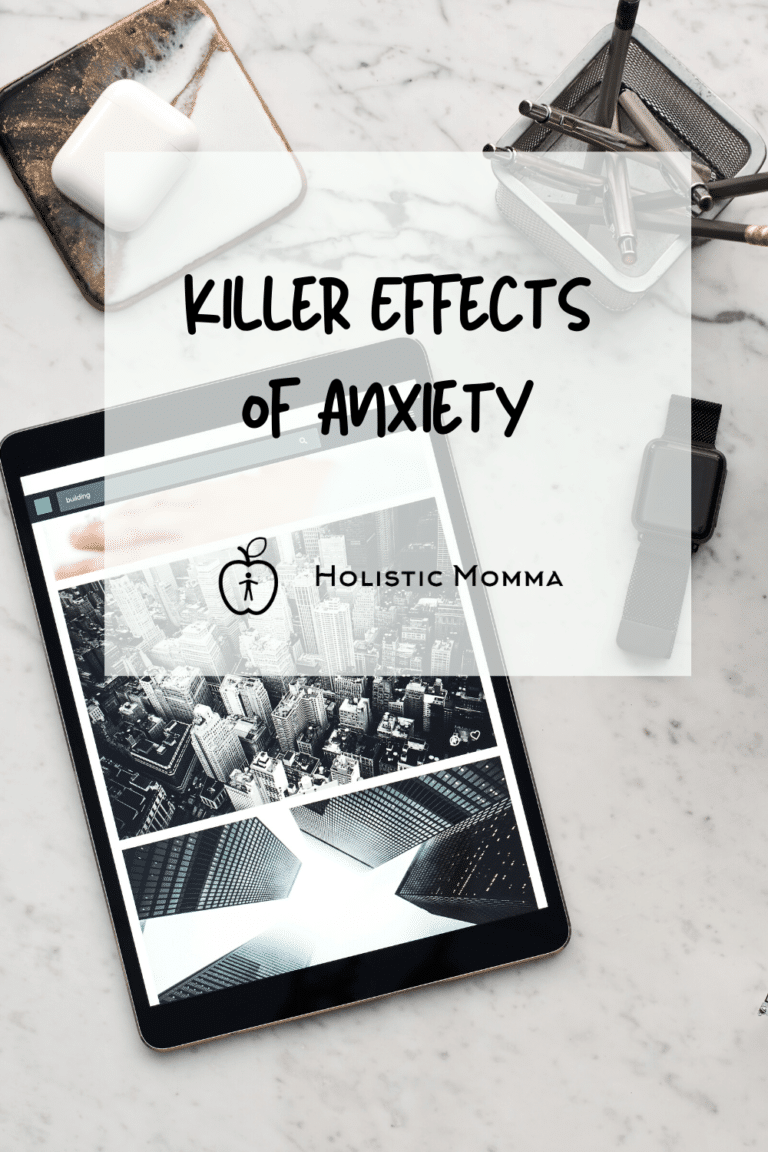High Functioning Depression: Best Natural Treatments?
High functioning depression is a type of depression where the sufferer can still function well in society. High functioning depression doesn’t mean that the person isn’t suffering from depression; it just means they can carry on with their life despite experiencing depressive episodes.
High-functioning depression has been described as a “double-edged sword” because while it allows people to maintain a normal lifestyle and participate fully in society, they also have a more challenging time recognizing that they need help for their mental health issues. This article will discuss what high functioning depression is, how you can tell if you have it, and treatments available for those who suffer from this condition. Then, scroll to the bottom if you want to try the quiz!

Table of Contents
What does it mean to be high-functioning?
It means that you can carry on with your daily life even though you have depression. High-functioning people usually don’t seek help for their depressive episodes; they keep it to themselves and try not to let anyone else notice what’s going on in their lives.
High-functioning depression is a more severe condition than chronic or major depression.
Someone suffering from severe depression may be diagnosed with a disorder such as major depressive disorder. Severe meaning that they may have suicidal thoughts.
While suffering from any form of depression can be difficult, high functioning sufferers have the added pressure of holding everything together when they may feel like falling apart at times.
It can be harder to detect since someone may seem delicate, and they may be opposed to seeking help due to appearing like they are okay.
High-functioning depression is at the fourth level, which means that your ability to cope with life will be severely impacted by your depressive episodes and may lead to serious health problems if not diagnosed correctly.
High-functioning people usually don’t recognize their symptoms as signs of a mental illness or seek help for them because they feel like it’s just “how they are.” If you think you might have high functioning depression, read on for helpful information.
- -How to Learn relaxation techniques you can do anywhere.
- -Identify anxiety in yourself and others.
- -Learn how to better react to situations and set a firm foundation for dealing with stressful situations.
- Use Natural Supplements, Dietary, and Lifestyle changes to help you feel less anxious sooner.
- I am a Counselor in Training, so I share what I learn through my education and experience and the price will go up shortly--- However! You will get all of the free updates I make to the course at no additional charge to you! As I learn through research, my education, and personal experimentation of new supplement regimens I will share them with you!
What actually causes depression?
There are many causes of depression, some known and others unknown. The most common causes include genetics (your family history), brain chemistry changes (neurotransmitters like serotonin), hormonal imbalances, drug abuse/addiction, major life events, or chronic pain that is not managed well by medication.
Furthermore, things such as anxiety, trauma, and alcoholism can contribute to depression.
Insulin resistance is prevalent in depression sufferers and other major psychiatric disorders. A combination of oxidative stress and a decrease in the production of ATP and high-energy related molecules. Without the brain receiving the glucose it needs, it can not function properly (hence why it’s hard to think when hungry). Your brain requires up to 20% of your body’s glucose supply and around 20-30% of your caloric intake. (Kim, 2018)
Someone struggling with grief is bound to feel a certain level of depression. Depending on how a person copes with their emotions, it may be easier for them to look like they struggle with high functioning depression and they don’t truly allow themselves to get upset.
High Functioning Depression Symptoms
According to the DSM-IV, there are several types of depressive episodes. High-functioning depression falls under atypical depression, which means sufferers tend to experience mood reactivity and sleep more than necessary. High-functioning depression symptoms are similar to major or clinical depression. Some signs of depression include:
- increased appetite or weight gain
- excessive feelings of guilt even though you aren’t responsible for whatever it is that’s making you feel this way
- High-functioning people can often be very critical of themselves without realizing what’s happening in their heads because they don’t think about how these feelings could indicate a mental illness like major depression or bipolar disorder.
- fatigue
- loss of interest in activities they once enjoyed
- even thoughts about death often without a suicide attempt
- High functioning people with depression also have a hard time concentrating on tasks at hand and making decisions that involve potential risks.
- feelings of worthlessness
- suicidal thoughts
If you feel any of these symptoms, especially the last two, PLEASE reach out to a mental health professional. They are there to help you work through this challenging experience you are enduring.
Treatments for High Functioning Depression
High-functioning depression treatment is similar to that of regular or major depression with a few added steps in order to help the sufferer cope more effectManyre many different types of treatments are available, including cognitive behavioral therapy, medication, and even online counseling through sites like Betterhelp.
Treatment may take a while before you feel any improvements so it’s important not to give up hope if you don’t see results right away. A key factor when dealing with high functioning depression is making sure you have strong support from family members who love and care about you because their encouragement can really make all the difference in helping move forward during challenging times..
People who suffer from high-functioning depression often don’t seek help because they feel like everything will turn out okay if they just keep pushing through but this isn’t true.
High-functioning people need support in order for their condition to improve so make sure you tell a family member/friend about what’s going on in your life. Ask them to help support you while getting treatment.
High functioning depression treatment typically includes cognitive-behavioral therapy (CBT) which helps correct faulty thinking patterns and medication.
High-functioning people can also benefit from joining a support group where they are around others who know what it’s like living with this type of depression. Having a community that can relate to it can make it easier with support.

Natural Treatments for Depression
Going to a mental health counselor is totally different than going to a psychiatrist. A counselor helps you with your concerns by using talk therapy, art therapy, or other forms of natural therapy to help you change your thinking.
Vs. A psychiatrist is going to prescribe you medications for your depression, anxiety, etc.
This is not to say you should avoid taking your medication. However, there are natural ailments listed below that help with depression overall.
I wrote a post about the health benefits of Niacin for Depression that talks about how to take it and how it impacts depressive symptoms.
In addition, research has shown many nutrients including DHA, B-vitamins, antioxidant-rich foods, exercise, and sunshine to be effective in helping someone deal with any form of depression.
A recent study showed that pyridoxal-5-phosphate, the active form of Vitamin B-6 combined with folate and B-12(methylcobalamin), dramatically contributes to neurotransmitter production via methylation reactions. (Kim, 2018)
Furthermore, exercising is a GREAT antidepressant! Yoga and weight training help bring your cortisol down which helps you have a better stress response. (Thirthalli et. al., 2013)
How does your gut health affect your depression?
Your body protects itself through a healthy tight nit gut combined with mucosal lining to fight off bacteria and foreign antigens. Inflammatory processes in the gut and brain have been shown to decrease the production of serotonin and Brain-derived neurotrophic factor (BDNF). Increased inflammatory cytokines were shown in mice who had a decrease in healthy bacteria Bacteroides spp. (Kim, 2018)
The enteric nervous system is where your gut and brain connect and why you get hangry ware hungry. Also why sugary foods can be very addicting especially when you are depressed. This is because they provide a short-term boost of serotonin.
Since there is often brain inflammation in depression and anxiety sufferers, focusing on minimizing this inflammation is a great place to start. In addition, leaky gut or intestinal permeability can contribute to a suppressed immune system and an increase in inflamTherefore, working on your gut health can be very beneficial in improving food sensitivities, immune response, and even anxiety and depression.
Prebiotic and Probiotic Foods for Depression
In addition, you can consume foods that help feed your healthy bacteria such as bananas, chicory root, artichoke, garlic, and more. These prebiotic foods are fibrous and they feed the probiotics that your body naturally produces.
Probiotic-rich foods would include foods that are fermented such as plain kefir (stay away from sugary yogurts or kefirs), kombuchas can have some. However, your better options are going to be like real pickles, kimchi, and kefir.
You can also supplement with a probiotic to help support gut healing, and it can help improve your gut-brain axis. The enteric nervous system is the part of your nervous system that is connected to the gut.
Therefore, by taking care of your gut health, you can dramatically improve your mental health and many other aspects of your health.
This probiotic is a 2-month supply and it contains a prebiotic fiber called inulin which helps feed the probiotics so they can survive while traveling through your digestive system.
Antidepressant’s Role on Gut Health
Well unfortunately a lot of medications can contribute to gut bacteria imbalances ESPECIALLY ANTIBIOTICS!!
I’m not saying don’t take your medications, however, it would be great for you to supplement with L-glutamine and a great probiotic when you are on medications. However, just take your probiotics and L-glutamine 2 hours before your medications.
Iproniazid is a drug that is an MAO-inhibitor which is an antidepressant but it’s also antibacterial. In most cases would be great, however, it doesn’t discriminate and can wipe out the healthy “good” bacteria that your gut does produce to protect you. (Kim, 2018)
How is High Functioning Depression Diagnosed?
High functioning depression can be difficult for your doctor to diagnose because you aren’t showing any outward signs of struggling as someone who has regular depression would do – i.e., not going out much, spending most days crying, etc..
Your doctor will ask questions from an extensive questionnaire they use called the PHQ-R which only takes five minutes but asks about depression symptoms and how they affect your life. The PHQ is a patient health questionnaire
However, just like other forms of depression such as major depressive disorder, you may display symptoms like insomnia, loss of interest in things you typically enjoy, etc. You can take the depression quiz below to get a better understanding of the symptoms to be aware of.
You can also take urine tests to see your neurotransmitter levels. This gives you a very accurate idea of what you need to improve whether it’s through changing your diet or supplementation.
The best part is that you can get your results from your home and you don’t have to have your doctor’s permission to find out information on YOUR OWN BODY. How amazing is that?!
Neurotransmitter levels can provide valuable insight into your health and wellbeing. This panel evaluates nine neurotransmitters: serotonin, GABA, dopamine, norepinephrine, epinephrine, glutamate, glycine, histamine and PEA.
This is the basic panel so it mainly just covers your neurotransmitters, giving you a better idea of what you should take and do in order to have optimal health.
In addition to the Basic Neurotransmitter Panel (LC100058), which tests for 9 neurotransmitters (PEA, Dopamine, Norepinephrine, Epinephrine, Serotonin, Glutamate, GABA, Glycine, and Histamine), we offer this expanded comprehensive panel which includes the 9 neurotransmitters mentioned above, the neuroactive amino-acid taurine and several NT precursors and metabolites, namely, Tyrosine, Tyramine, DOPAC, 3-MT, Normetanephrine, Metanephrine, Tryptamine, and 5-HIAA.
Additional Self-quiz to see if you have High Functioning Depression
Do you feel tired often?
Have lost interest in activities you used to enjoy?
Are your feelings easily hurt or do small things bother you more than they once did?
Do thoughts about death come up without an actual suicide attempt being made?
Have problems concentrating on tasks at hand causing errors where there wouldn’t be any before?
If the answer is yes to three out of these five symptoms then you may be showing signs of High-functioning depression. Which is something that needs to be treated because it can lead to major or clinical depression.
- How to Find a Trauma Therapist in Tampa
- L-Glutamine for Leaky Gut: Critical Reasons You Need to Take it
- How Much Does IVF Cost?
- How to Increase GABA Naturally- The Complete Guide
- Parenting Guide for Understanding Your Communication Style
Is there a depression quiz I can take?
Yes, there is a quiz that Aaron Beck created that is called Beck’s Depression Inventory. This depression quiz is a commonly used one by therapists/mental health counselors to evaluate an individual’s level of depression.
Questions are graded on a 0-3 scale, there are 21 questions and you score yourself 1-10 these are normal, all the way up to over 40 as being extremely depressed.
If you want to take Beck’s Depression quiz, click the button below.
In Summary
It is best to talk to your doctor if you have any of the depressive symptoms listed above or if you tested high on the Beck’s Depression Inventory then I recommend making an appointment with a mental health counselor.
Although most go to their doctor’s first, a mental health counselor can help you to make lifestyle changes and focus on what is contributing to your depression.
The help of a holistic, functional, or naturopathic doctor may be helpful in looking at the chemical aspect of your high functioning depression.
Just a reminder that rest is just as important as going all the time. Resting allows you to perform better in your daily activities than you would if you just pushed through your fatigue.
References:
Kim, Y.-K. (2018). Understanding depression vol. 1. Springer.
Substance Abuse and Mental Health Services Administration. DSM-5 Changes: Implications for Child Serious Emotional Disturbance [Internet]. Rockville (MD): Substance Abuse and Mental Health Services Administration (US); 2016 Jun. 3, DSM-5 Child Mental Disorder Classification. Available from: https://www.ncbi.nlm.nih.gov/books/NBK519712/
Thirthalli, J., Naveen, G. H., Rao, M. G., Varambally, S., Christopher, R., & Gangadhar, B. N. (2013). Cortisol and antidepressant effects of yoga. Indian journal of psychiatry, 55(Suppl 3), S405–S408. https://doi.org/10.4103/0019-5545.116315
Originally posted 2021-09-28 17:20:12.
Megan Santiago
Latest posts by Megan Santiago (see all)
- How to Find a Trauma Therapist in Tampa - September 30, 2024
- L-Glutamine for Leaky Gut: Critical Reasons You Need to Take it - March 10, 2024
- How Much Does IVF Cost? - March 10, 2024





